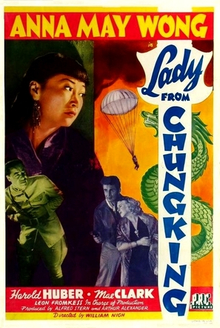| Lady from Chungking | |
|---|---|
 Theatrical release poster | |
| Directed by | William Nigh [1] |
| Written by | Milton Raison Sam Robins |
| Produced by | Arthur Alexander Alfred Stern |
| Starring | Anna May Wong |
| Cinematography | Marcel Le Picard |
| Edited by | Charles Henkel Jr. |
| Music by | Lee Zahler |
| Distributed by | Producers Releasing Corporation |
Release date |
|
Running time | 66 minutes |
| Country | United States |
| Language | English |
Lady from Chungking is a 1942 American war film.